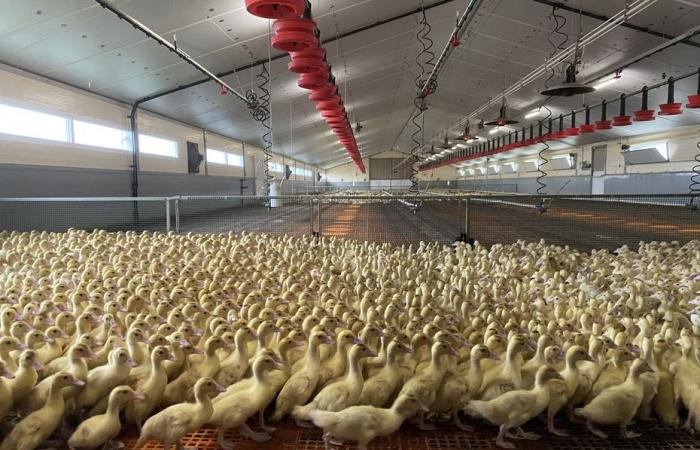A first case of avian flu was identified in Landes last week. This Saturday, November 8, the risk level linked to avian flu went from “moderate” to “high”, forcing all breeders to shelter their poultry to avoid the risk of spread. Despite everything, they remain positive about the progress linked to vaccination.
Company
From daily life to major issues, discover the subjects that make up local society, such as justice, education, health and family.
France Télévisions uses your email address to send you the “Society” newsletter. You can unsubscribe at any time via the link at the bottom of this newsletter. Our privacy policy
And again it was repeated. Since last Friday, poultry farmers in France have once again been required to isolate their animals, with the risk level of avian flu having been raised from “moderate” to “high”. Damien Sourbié had no choice. In one weekend, this duck breeder in Montsoué, in the Landes, had to hastily confine the 5,000 ducks on his farm. From breeding to processing, it works in a closed circuit, thus limiting the risk of contamination, but the rule is the same for everyone.
“We avoid going near buildings, we’re scared,” he confides, evoking the bitter memory of last May, when an episode of avian flu led to the complete slaughter of his animals. “We no longer play with fire after experiencing this”he adds.
The start of the week was marked by the appearance of a first case of avian flu in the Landes. A decree, published on November 8 in the Official Journal, formalizes the transition to “high” risk level. This decision is linked to the high viral activity in migration corridors, through which migratory birds transmit the disease within the territory. Authorities have reported rapidly increasing infection dynamics among wild birds since September.
Since the start of the season, “six outbreaks of contamination in poultry farms, two concerning captive birds and ten cases among wild fauna” have been identified in France. “Even us in a closed circuit, we know that the disease can enter, details the Montsoué breeder, Damien Sourbié, his eyes fixed on his outdoor farm emptied of its animals. C“It’s a collective operation and we have to be united.”
The confinement obligation is, however, accompanied by a major advance thanks to vaccination, underlines Jean-Pierre Dubroca, president of the web-footed commission at the Landes Chamber of Agriculture. “We knew that vaccination could not prevent the introduction of the virus, but it limits its spread between farms. This is significant progress for our sector.” According to him, this first case of contamination did not spread to the surrounding area, proof that vaccination plays a crucial role in addition to confinement.
Damien Sourbié also explains that, although vaccination limits the risks of spread, the human factor remains difficult to control: “The vaccine protects the ducks, but all it takes is one contact or poor handling for the virus to be brought back to the farms. We have no room for error in the application of biosecurity measures. “
Today, we have not yet mastered humans, which is why we must be irreproachable.
Damien Sourbiéduck breeder
Damien Sourbié works in a closed circuit. From breeding to processing.
•
© Vivien Roussel France 3 Aquitaine
For the moment, the combination of vaccination and confinement remains the strategy in place, even if breeders hoped for a reduction in measures after the first positive results of the vaccination campaign. Jean-Pierre Dubroca notes: “Last year, we had the obligation to successfully vaccinate, because France is a pioneer in this approach. But this year, with more hindsight, the breeders hoped obtain relief from sheltering since vaccination seemed to have a positive effect.”
We knew that vaccination would not protect the introduction, which happened, but we are monitoring and we can clearly see that it is not spreading and that is a real step forward for us.
Jean-Pierre DubrocaPresident of the web-footed commission at the Chamber of Agriculture
Agricultural authorities are working on adjustments to vaccination protocols and conducting trials to adapt practices to realities on the ground. Breeders say they are optimistic about a possible gradual adaptation of the rules, hoping for a return to more normal activity. Despite these challenges, the sector wants to be reassuring as the end-of-year holidays approach: “Production volumes are normal this year. There will be products for everyone.”






